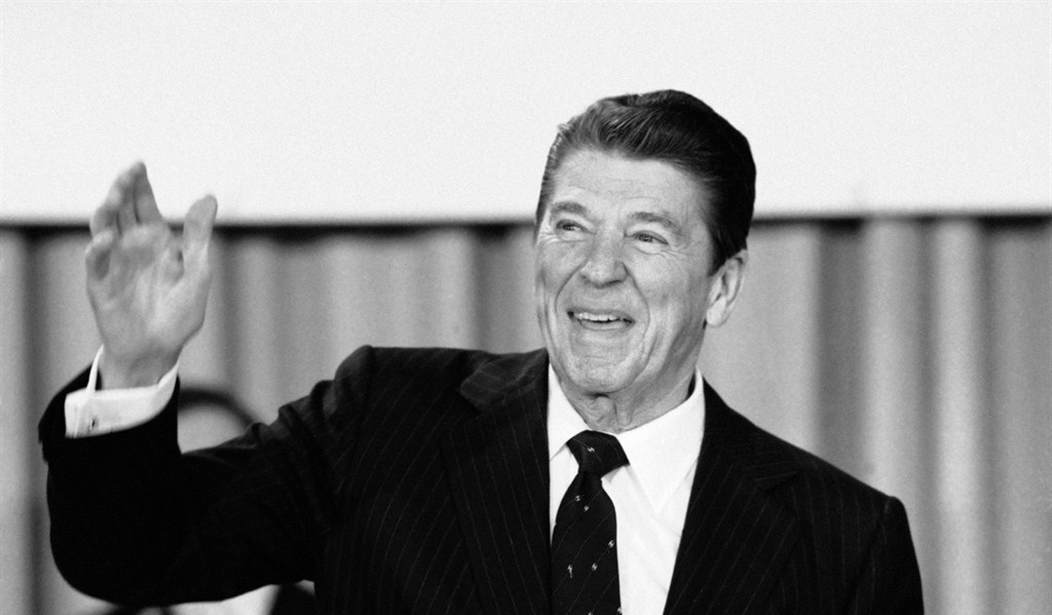One of the best-loved and often repeated quotes from Ronald Reagan was:
“Government’s view of the economy could be summed up in a few short phrases: If it moves, tax it. If it keeps moving, regulate it. And if it stops moving, subsidize it.”
[Remarks to the White House Conference on Small Business, Aug. 15, 1986]
In celebration of the Gipper's birthday, Townhall is featuring a series of concise examples of Mr. Reagan's wisdom, mostly in his own words, drawn from The Reagan Resolve, a monograph compiled by the Carleson Center for Welfare Reform.
Ronald Reagan understood that economic activity is affected by the level of taxation, particularly by the level of marginal tax rates — the rate that applies to the last dollar earned. The tax rate determines how much the producer is allowed to keep out of what he or she produces. If tax rates are high the incentives for productive activity, such as savings, investment, work, business expansion, business creation, job creation, and entrepreneurship are reduced. The result is fewer jobs, lower wages, and slower economic growth, or even economic downturn.
In 1981, under President Reagan, the top tax rate for income was brought from 70% down to 50%, with a 25% across-the-board cut in income tax rates for everyone in all the other tax brackets. The tax reform in 1986 subsequently reduced tax rates even further, leaving just two rates, 28% and 15%.
Reagan also understood that our tax code imposes multiple forms of taxation on capital income. First, a dollar that an American corporation earns is taxed at the corporate income tax rate, totaling roughly 40% on average now — counting federal and state corporate income taxes. If the remainder of that dollar is then paid to an investor in dividends, it is taxed a second time through the individual income tax code at the dividend rate — currently 15%. President Obama has proposed increasing the dividend tax rate from 15% to an astounding 43.4%. Applying Obama’s proposed rate to the 60 cents remaining after paying the corporate income tax would leave just 34 cents for the investor out of the original dollar earned. But, it gets even worse for investors under the tax code.
Recommended
The capital gains tax is yet a third layer of taxation on capital income by levying a 15% tax on any gain in the value of capital over time. Finally, the death tax (the popular name for the estate tax) imposes a fourth tax on capital income, taking roughly half of whatever an investor is able to retain and leave to his children — which would leave the children with just 17 cents out of the original dollar the investor earned during his lifetime.
As Ronald Reagan put it:
"Any system that penalizes success and accomplishment is wrong. Any system that discourages work, discourages productivity, discourages economic progress, is wrong.
"If, on the other hand, you reduce tax rates and allow people to spend or save more of what they earn, they’ll be more industrious; they’ll have more incentive to work hard, and money they earn will add fuel to the great economic machine that energizes our national progress. The result: more prosperity for all — and more revenue for government.
“A few economists call this principle supply-side economics. I just call it common sense.”
[“An American Life” by Ronald Reagan, p. 232]
These are the reasons we believe Reagan would today support eliminating the capital gains tax and the death tax, and allow a deduction for corporate dividends so they are not taxed by the corporate income tax. This would be part of Reagan’s “common sense” prescription for America’s ailing economy.
See The Reagan Resolve at: http://theccwr.org/ReaganResolve.html.
For more information, see The Carleson Center for Welfare Reform.

























Join the conversation as a VIP Member